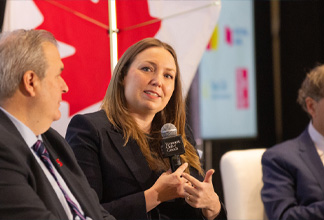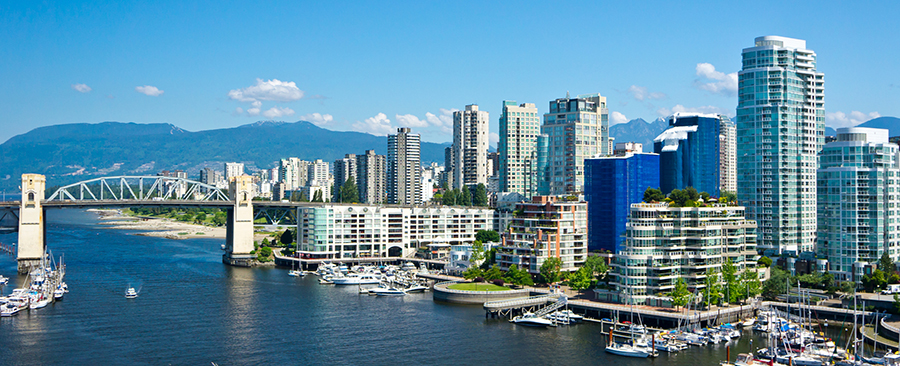Youth Report: What the Future of Work Looks Like in Canadian Cities
Written by Regan Ray
Published on March 27, 2019
minute read
Share:
How does the future of work add up for Canadian youth? Before determining retirement goals or coming up with an investment plan to achieve them, we need to set ourselves up for success. What does that mean for young people starting out today? Or more precisely, where does that mean for today's youth?
In Canada, that became a little clearer recently thanks to the new YouthfulCities Urban Work Index, which offers a way for youth to explore the best cities for them to work.
The Index, funded by RBC Future Launch, ranks 21 cities across Canada on four key themes that matter to youth — affordability, education, employment and entrepreneurship.
Is the suspense killing you? Alright, before we dig into some of the details, here's the answer you're looking for: The highest-ranked city is Edmonton. Rounding out the top five are Montreal, Ottawa, Sudbury and Kitchener-Waterloo. Now for the details. Here's some of what the report found.
What's Important to Today's Youth?
"Work is not just about getting a job for youth," says Robert Barnard, co-founder of YouthfulCities. "It's a process involving a complex set of attributes that make up a significant part of their lives." This is where the Urban Work Index comes into play, which found overall that "youth clearly want more affordable housing, less student debt, good jobs and cities that really support entrepreneurs."
To build the Index, researchers interviewed 170 youth across Canada and developed 16 "attributes of work" that could be ranked. These were considered the key ingredients needed to create a satisfying working life.
The four key themes — affordability, education, employment and entrepreneurship — were broken down into 16 attributes, which were then broken down further into 48 indicators. For example, under affordability, leisure is one of the attributes. It comes with indicators such as the price of one domestic beer in the grocery store and two tickets to see a movie. For each indicator, cities were given points.
Out of a total possible 1,310 points, top-ranked Edmonton received 713.86. As the report notes, Edmonton's tally illustrates that "no city is perfect for youth looking for work in urban centres" and there is plenty of work to be done.
A Tale of Three Cities
With Toronto and Vancouver landing around the middle of ranked cities, the report's authors say their finish "reflects a story that may be different from assumptions about where the best places in Canada are to work."
Looking at the results for Toronto, Vancouver and Edmonton helps illustrate how the four key themes play out in the rankings. A city might dramatically outperform in one area, but fall short in others. These nuanced results, rather than the final ranking, can really help highlight the pros and cons of each city for youth on the move.
Edmonton, #1
Edmonton took the top spot based mainly on its balanced results. It scored quite a few top-10 finishes in each of the four main themes, particularly in affordability, including the most affordable transportation. Education scores were reasonable and government entrepreneurship subsidies were high, which could give business-minded youth a leg up.
Index Takeaway: The Alberta city shines with affordable housing, transit and education, along with strong entrepreneurship programs. This is a city for balanced opportunities.
Toronto, #10
Toronto's well-documented "affordability crisis" pulled Canada's largest city down to number 10 in the ranking, with housing as the main culprit. Low scores for basic employment and affordable education also piled on. But entrepreneurship, career employment and the overall economic profile of the city kept Toronto's ranking near the middle of the pack.
Index Takeaway: "The Big Smoke" is a great place for entrepreneurship and career-building, but expensive housing and education must be addressed.
Vancouver, #15
Vancouver is widely considered a beautiful, if wildly expensive, place to live. The Index results mostly support this view. Similar to Toronto, affordability is the city's greatest weakness and it takes the prize for most expensive housing in the country. Vancouver does, however, excel in affordable education, career employment and overall economic profile.
Index Takeaway: Vancouver is a great city for getting educated and finding work, but housing remains out-of-reach for many.
The Future of Work
According to YouthfulCities, Canadians between the ages of 15 and 29 will be the most educated youth in history, but because education costs have increased so quickly, they will also be the most indebted.
Eighty-seven per cent of youth today live in cities — that's where the jobs are. So, how can today's youth reconcile the costs of living with the career and entrepreneurial opportunities available in today's evolving workforce? Knowing what cities have to offer is a great start.
Getting suitably set up for success is one of the greatest gifts we can give our future selves.
Here's how the overall ranking played out:
Edmonton
Montreal
Ottawa
Sudbury
Kitchener/Waterloo
Hamilton
Quebec City
Mississauga
Victoria
Toronto
St. John's
Moncton
Calgary
Kelowna
Vancouver
Oshawa
Yellowknife
Charlottetown
Saskatoon
Halifax
Winnipeg
RBC Direct Investing Inc. and Royal Bank of Canada are separate corporate entities which are affiliated. RBC Direct Investing Inc. is a wholly owned subsidiary of Royal Bank of Canada and is a Member of the Investment Industry Regulatory Organization of Canada and the Canadian Investor Protection Fund. Royal Bank of Canada and certain of its issuers are related to RBC Direct Investing Inc. RBC Direct Investing Inc. does not provide investment advice or recommendations regarding the purchase or sale of any securities. Investors are responsible for their own investment decisions. RBC Direct Investing is a business name used by RBC Direct Investing Inc. ® / ™ Trademark(s) of Royal Bank of Canada. RBC and Royal Bank are registered trademarks of Royal Bank of Canada. Used under licence. © Royal Bank of Canada 2019. All rights reserved.
The views and opinions expressed in this publication are for your general interest and do not necessarily reflect the views and opinions of RBC Direct Investing. Furthermore, the products, services and securities referred to in this publication are only available in Canada and other jurisdictions where they may be legally offered for sale. If you are not currently resident of Canada, you should not access the information available on the RBC Direct Investing website.
Explore More

Economic Outlook: Uncertainty is Here to Stay, So What's Next?
Takeaways from the Economic Club of Canada’s Annual Event
minute read

3 things: Week of December 15
What the Inspired Investor team is watching this week
minute read

Year in Review: Tariffs, Tech, Rates and More
Looking back at some major stories of 2025, plus lessons investors can take into the new year
minute read
Inspired Investor brings you personal stories, timely information and expert insights to empower your investment decisions. Visit About Us to find out more.







